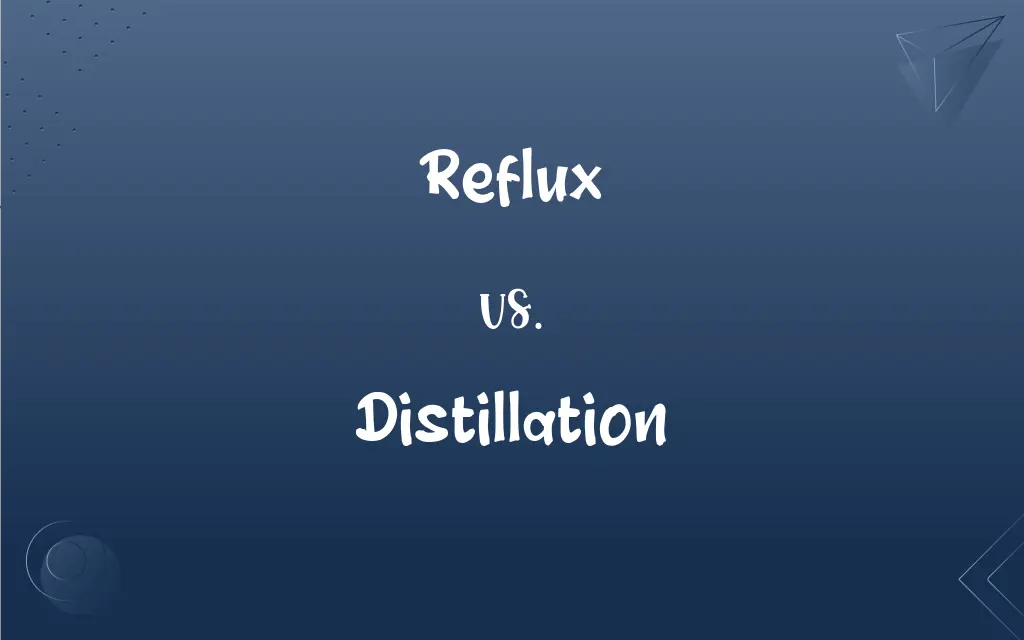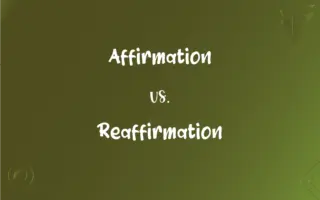Reflux vs. Distillation: What's the Difference?
Edited by Aimie Carlson || By Harlon Moss || Published on November 29, 2023
Reflux refers to continuous boiling and condensation of a mixture to purify compounds. Distillation refers to process of separating components based on boiling points.

Key Differences
Reflux involves continuously boiling a mixture and condensing the vapors back into the liquid to enhance reaction or purification. However, distillation is a technique to separate components in a mixture based on differences in their boiling points.
Reflux is used to maintain a reaction mixture for a prolonged period at a constant temperature, often in chemical synthesis. While, distillation is primarily used for purifying liquids or separating liquid mixtures.
In reflux, the mixture is heated in a flask with a condenser atop to prevent loss of any reactants. Whereas, distillation involves heating a liquid to form vapor and then cooling the vapor to form a separate liquid.
Reflux ensures the reaction proceeds without losing any volatile components. In contrast, distillation results in the separation of substances with different boiling points, achieving purification.
There are various types of reflux, such as total reflux and partial reflux, used based on the desired outcome. Distillation can be simple or fractional, where fractional is used for mixtures with close boiling points.
ADVERTISEMENT
Comparison Chart
Purpose
Enhance reactions, purify compounds
Separate components by boiling points
Process
Continuous boiling and condensation
Boiling and condensing different components
Equipment
Flask and condenser
Distillation column, flask, condenser
Application
Chemical synthesis, purification
Purifying liquids, separating mixtures
Variations
Total, partial reflux
Simple, fractional distillation
ADVERTISEMENT
Reflux and Distillation Definitions
Reflux
A method in chemistry to heat a mixture while preventing loss of any components.
Reflux was necessary to maintain the reaction mixture's composition.
Distillation
A technique for purifying liquids by vaporization and subsequent condensation.
Water distillation provided pure, drinkable water.
Reflux
A process in chemical synthesis for heating mixtures under controlled conditions.
The synthesis required reflux for several hours for completion.
Distillation
A method to separate mixtures into their constituent parts.
Essential oils are extracted from plants through distillation.
Reflux
A technique used to control the concentration of volatile substances in a mixture.
Reflux helped maintain the desired concentration of solvents.
Distillation
A physical separation process for substances with different boiling points.
The distillation process was critical in the production of spirits.
Reflux
Reflux is the process of boiling a mixture and condensing the vapors back into the liquid.
The chemist used reflux to ensure complete reaction of the reagents.
Distillation
The act of heating a liquid to create vapor and then cooling to create a liquid.
Distillation of crude oil yields various petroleum products.
Reflux
Continuous vaporization and condensation of a liquid to purify or react substances.
Reflux enabled the purification of the organic compound.
Distillation
Distillation is a process of separating components in a mixture based on boiling points.
Distillation was used to separate alcohol from the fermented mixture.
Reflux
A flowing back; ebb.
Distillation
The evaporation and subsequent collection of a liquid by condensation as a means of purification:the distillation of water.
Reflux
(Medicine) Backflow, as of gastric acid into the esophagus.
Distillation
The extraction of the volatile components of a mixture by the condensation and collection of the vapors that are produced as the mixture is heated:petroleum distillation.
Reflux
(Chemistry) The process of refluxing.
Distillation
A distillate.
FAQs
What is reflux in chemistry?
Boiling a mixture and condensing the vapors back into the liquid.
How does distillation work?
By heating a mixture to vaporize components and then condensing them separately.
Is reflux used in distilling spirits?
Yes, it's used in the distillation process to enhance purity.
What are common uses of reflux?
In chemical synthesis and purification processes.
What can be separated by distillation?
Liquids with different boiling points, like alcohol from water.
What is the role of a condenser in distillation?
To cool vapors back into liquid form.
Can distillation purify any liquid?
It's effective for many, but not all, especially with very similar boiling points.
Why is reflux important in organic chemistry?
It helps maintain reaction conditions and prevent loss of volatile components.
Can reflux be used for all chemical reactions?
It's most effective for reactions needing prolonged heat and condensation.
Can distillation remove all impurities from water?
It removes many, but not all types of contaminants.
How long can a reflux process last?
From a few hours to several days, depending on the reaction.
How does temperature control play a role in distillation?
Precise temperature control is crucial for effective separation.
What equipment is essential for distillation?
A distillation column, flask, and condenser.
What's the difference between simple and fractional distillation?
Fractional is used for mixtures with close boiling points, simple for wider differences.
Can reflux be automated?
Yes, with advanced lab equipment and control systems.
What safety measures are important in reflux?
Proper ventilation, heat control, and use of appropriate glassware.
What types of industries use reflux?
Pharmaceutical, chemical manufacturing, and research labs.
Is reflux a type of distillation?
It's a related process, often used within distillation to improve purity.
What are the limitations of distillation?
It can be energy-intensive and less effective for very similar boiling points.
What innovations have improved distillation techniques?
Developments in fractional distillation and energy-efficient designs.
About Author
Written by
Harlon MossHarlon is a seasoned quality moderator and accomplished content writer for Difference Wiki. An alumnus of the prestigious University of California, he earned his degree in Computer Science. Leveraging his academic background, Harlon brings a meticulous and informed perspective to his work, ensuring content accuracy and excellence.
Edited by
Aimie CarlsonAimie Carlson, holding a master's degree in English literature, is a fervent English language enthusiast. She lends her writing talents to Difference Wiki, a prominent website that specializes in comparisons, offering readers insightful analyses that both captivate and inform.






































































